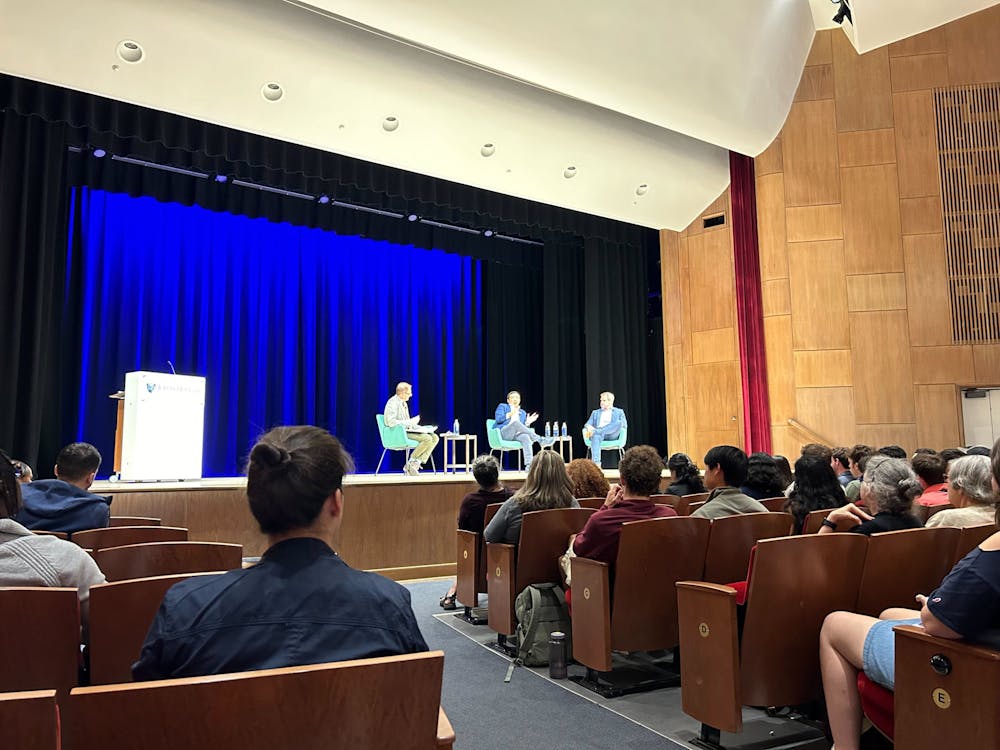On Thursday, Sept. 26, the Hopkins Lecture Series, in partnership with the SNF Agora Institute and the Aronson Center for International Studies, hosted a lecture on the future of the two-party system in Shriver Hall. The talk hosted Andrew Yang, former presidential candidate in the 2020 election cycle as well as founder of the Forward Party, and Adam Kinzinger, former U.S. Representative for Illinois’ 16th district.
The two speakers discussed their evaluation of today’s political climate and paid special attention towards the two-party system currently in place in the United States. Yang and Kinzinger drew from their own experiences in the American political sphere to illustrate the current partisan divide between the Democratic and Republican parties, as well as the resulting limitations of the two-party system.
Kinzinger elaborated on the role of fear in the two-party system and why many Democrats or Republicans may exhibit blind support of their respective parties.
“The greatest way to compel action in the short term... is fear,” Kinzinger said. “The thing that radicalized people the most between the election and January 6th were the 10 emails they got a day with the headlines ‘They’re stealing the election! They’re stealing the election!’ Fear is compelling... If you’re constantly playing that mode, then the only thing you can do is fall back on the protection of your party.”
Yang, agreeing with Kinzinger, furthered the discussion by drawing on his experience as a Democratic political candidate in the 2020 election, highlighting other factors that perpetuate the divide of the two-party system.
Yang explained a situation in which he listened to a Fox News viewer explain why she supported him.
“When asked why, she said, ‘He’s the only one who doesn’t seem to be judging me,’” Yang remembered. “A lot of the traditional democratic talking points are about that us-versus-them dynamic.”
In an interview with The News-Letter, senior Christine Wang weighed in on how she aims to help minimize the divide of the two-party system, advocating for empathy in day-to-day life to overcome the us-versus-them dynamic Yang described.
“One way that I want to help is to seek empathy in every single article or every piece of media that I see, trying to see what other people think, their perspective, and find kindness in that. Empathy is so important but very overlooked in today’s society,” Wang said.
Responding to Yang, Kinzinger called on his experience as a former U.S. representative to provide a behind-the-scenes view of running for election, which may explain the us-versus-them mindset that Yang mentioned earlier. He remembered a term in which, immediately after being sworn into office, he attended a conference meeting in which the leadership veered the meeting’s focus toward funding.
Despite having been sworn in that day, it was only two years until the next election, so their efforts were forced to be geared toward funding from the first second in office. Kinzinger went on to state how, with this excessive dependence on funding, politicians will be more motivated to gain votes by using fear tactics against the opposing party in order to get elected rather than striving for collective change.
Yang suggested that the issue may boil down to a matter of money and morality.
“Why are things going wrong?” Yang asked. “Money. … Right now in American life, people aren’t doing the right things. Doing the wrong thing will pay, and doing the right thing will get you cast out.”
Kinzinger then recognized another aspect that he believes is part of the two-party system: Democracy is one of the hardest forms of government. He postulates that Americans might assume it’s the easiest because of their familiarity with the construct, but in reality, it’s a system that requires trust and guardrails to function properly — two things Kinzinger believes is much easier said than done.
Kinzinger’s resolution to this problem was a radical acceptance and embrace of one’s neighbor.
“The most important thing is to teach you all to have differences and appreciate them together,” he concluded.
Andrew Lu, a senior who attended the event, commented on Gen Z’s role in and responsibility for the two-party system in an interview with The News-Letter.
“In the nation now, everything is pretty radical,” Lu observed. “It’s important that we hold true to our beliefs, that [we] always have an open mind and never just cast out people because they have different opinions than [us]. If your ideal is ‘whatever I believe you must believe,’ then you’re not a supporter of democracy.”
Senior Yasmine Mettawa, who helped coordinate the event, also wanted to remind Gen Z of their power and responsibility in this upcoming election in an interview with The News-Letter.
She described the importance of teaching younger generations about political polarization and the current state of democracy in the U.S. Younger generations have been raised around heightened political polarization — Mettawa stressed that new voters in upcoming elections should be taught that the partisan divide has not always been a reality in the American political climate.
“These are the people that are going to be voting in this election… and it’s important for them to feel represented, and in order to do so, there needs to be some questioning of the current model of the two-party system,” she said.





